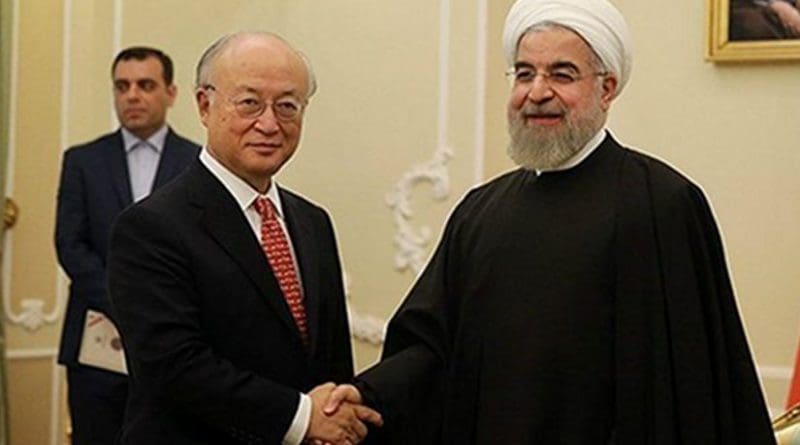Examining Iran’s Ballistic Missile Test – Analysis
By IPCS
By Kimberley Anne Nazareth*
Iran’s recent firing of its ballistic missile – the second since the nuclear deal – has further fueled regional apprehensions regarding the deal. Do these concerns mirror those of the international community? What are the motivations and potential implications of such a test?
Iran had political motivations, both regional and global, for testing the ballistic missile. The posturing was to demonstrate that even though the nuclear deal has neutered Iran’s nuclear ambitions, it does not signify any diminishment of the country’s role, regionally.
Meanwhile, the regional countries are having an ‘I told you so moment’. They are on edge; and with the continuous sparring and the politicisation of multiple conflicts, their apprehensions appear to have come true. Or have they? Even if that is the case, the P5+1 are not paying heed to it. Also, the fear of other countries developing and testing their own ballistic missiles should not be blown out of proportion, because, although Saudi Arabia and Israel do possess the ability to do so, they are the US’ allies in the region – a far more important factor.
Riyadh and Tel Aviv had warned that Tehran would flex its muscles in the region if the nuclear deal went through. However, this should not be taken as the US’s regional policy. The deal is an indication that though Washington and its Western allies have concerns regarding Iran, the resolution of the nuclear issue was more important than any other, be it its ballistic missile programme or its involvement in ‘terrorist activities’; and therefore, that fell outside the purview of the deal.
Via sanctions on Iran’s ballistic missiles programme, the US has tried to calm the frazzled nerves of the regional states. However, though the regional countries are upset at the delayed response, they should look at it in a positive manner that the US and other P5+1 members do not view this as a major threat as this is just Iran’s way of showboating. The fact that US Secretary of State John Kerry was able to negotiate the release of the American prisoners in Iran with a fair amount of ease should be an indication of how far the two countries have come.
There is another aspect to this, wherein the US is looking for a strong state (like Iran) to keep the regional situation from getting out of control. At one point in time, Washington did rely on Riyadh and Tehran as the pillars of its policy in the West Asian region. Could this be a turn to those times? Iran has the ability to play this role.
Internal Dynamics
There is a lot of strong political jargon being tossed out on both sides. This was expected. This tug of war between the two, though harmless, can be attributed to a number of reasons such as calming internal dissent over the deal to portray to the international community that the deal only pertains to nuclear policy and does not affect other foreign policy agendas.
However, this could spill out into the barrage of regional problems and amplify the proxy war situation. Iran’s internal structure is fractured; the conservatives led by Ayatollah Khamenei, though in a minority, still have primary influence, as opposed to the majority moderates and pragmatists led by President Hassan Rouhani and Foreign Minister Javad Zarif. There are several conservatives that are apprehensive vis-à-vis what the deal may mean for the future of US-Iran relations and Iran’s future in the region.
Given the upcoming elections, the question is regarding how high foreign policy is placed on the agenda and how useful it is with regard translating into seats? A counter argument is that this may not be about gaining and instead about retaining seats. This missile test is a signal to the hardliners that the deal did not mean improved relations with the West or that Iran was on its way to becoming a western stooge.
In the US, President Barack Obama has had to soothe domestic discontent, especially since it is an election year in the country. This has temporarily exacerbated the situation in Congress across the aisle. Therefore, the renewed Republican condemnation to the deal was unsurprising. The Democrats who are motivated politically as a result of the upcoming elections have also called on Obama to take swift action against Iran, and the bi-partisan Deutch-Kennedy bill is one such attempt.
Looking Beyond
The test has been used politically by both sides. Iran has used it to reinstate its muscle regionally and calm internal dissent for the deal, especially with elections round the corner. The US’ response with the imposition of sanctions will try and unruffle feathers, but they have other concerns. If the members move too strongly against the test, it could have adverse effects on the deal or gaining Iran’s cooperation in other areas.
Given how 2016 is an election year for both Iran and the US, certain power posturing can be expected. Therefore, Tehran’s ballistic missile test was another political gimmick that is being put to different uses by different countries, and the matter should not be blown out of proportion.
* Kimberley Anne Nazareth
Research Intern, Nuclear Security Programme
E-mail ID: [email protected]

